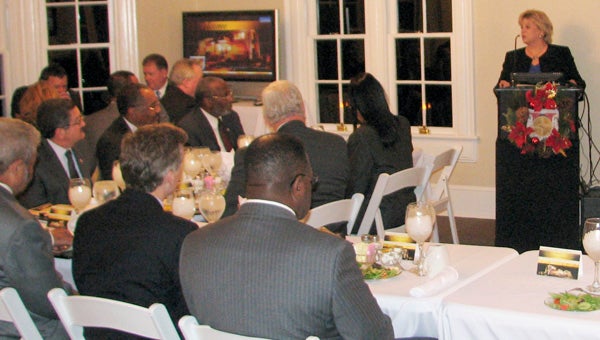Transportation dominates discussion
Published 9:34 pm Wednesday, November 28, 2012

Mayor Linda T. Johnson welcomes guests to the legislative dinner held Tuesday at the Obici House at Sleepy Hole Golf Course.
Transportation dominated the conversation during the legislative dinner hosted by Suffolk City Council for members of the city’s General Assembly delegation Tuesday.
The event at Sleepy Hole’s Obici House was attended by four of the city’s legislators, as well as assistants for a couple others. Topics varied from enterprise zones to uranium mining, but the ever-present problem of how to fund the state’s transportation needs took up the majority of the evening.
“The situation continues to deteriorate,” city intergovernmental affairs and special projects manager Sherry Hunt said during a presentation at the dinner. “There’s a cost of doing nothing.”
Current projections indicate that the state will be unable to fully match federal funds or construct new roads in only five years. The Urban Crescent Coalition, a group of localities in Hampton Roads, the Richmond area and Northern Virginia, have proposed possible solutions such as increasing the gas tax, the sales tax on vehicle purchases, the general sales tax and vehicle registration fees, as well as tolls.
Delegate Chris Jones (R-76th) acknowledged the situation is dire, especially on the Midtown and Downtown tunnels between Norfolk and Portsmouth, which have been taken over by a private entity that plans to begin tolling them, costing regular commuters about $1,000 yearly.
“We have been punished for our inaction on the Midtown/Downtown, and we need to make sure that doesn’t happen again,” Jones said.
He said he plans to help work on a fix for transportation this year. He ruled out only one possible factor.
“One thing I’m not in favor of is having a referendum. We should solve the problem,” he said, adding later, “People just aren’t going to vote to raise their taxes.”
Jones also criticized the Public-Private Transportation Act, under which the tolling situation at the tunnels was created. A new Route 460 project also is in the works and also will include tolls.
“The PPTA process is flawed,” he said, adding that some bills are in the works to fix it.
Whatever the eventual solution, Jones said, it needs to be a real fix, not just something that “gives the illusion” of an answer.
Delegate Matthew James (D-80th) said he is not in favor of tolls.
“You’re taking money of out their pocket,” he said. “I think we need to look at putting the genie back in the bottle.”
Delegate Lionell Spruill (D-77) said the real solution to Hampton Roads’ transportation woes will come when the region begins presenting a united front at the General Assembly, deciding on regional priorities and then pursuing funding for them together.
Sen. John Miller (D-1st) agreed, saying the region has begun to figure that out in recent years.
“We’re now speaking with more of one voice than we were,” he said.
On another topic, legislators presented possible objections to a change Suffolk wants to see in the way eligibility is determined for enterprise zones.
The zones encourage companies to locate in low-income areas, therefore providing jobs, through tax credits and similar incentives. Suffolk used to participate in the program but lost its zone in 2009, when it was deemed no longer eligible because income levels had risen across the city.
“We’re growing as a city, but there are still areas in this city that could benefit from the tools in the enterprise zone program,” Hunt said.
The city is proposing eligibility be determined by individual census tracts. Some legislators worried doing so would create many new enterprise zones.
“Those tax credits are real money,” Jones said. “If you had everyone doing it, you would have a lot more tax credits going out.”
But Hunt said the city is not asking for an increase in the number of zones approved each year — only “an even playing field.”
“Not only is it an economic tool, this is a tool to get rid of blight,” Councilman Charles Parr said. “If you narrow it down to the census tracts, you’re getting where the problem is.”
Council members and legislators alike agreed the evening was productive.
“I think we’re all committed to working together,” Mayor Linda T. Johnson said.





